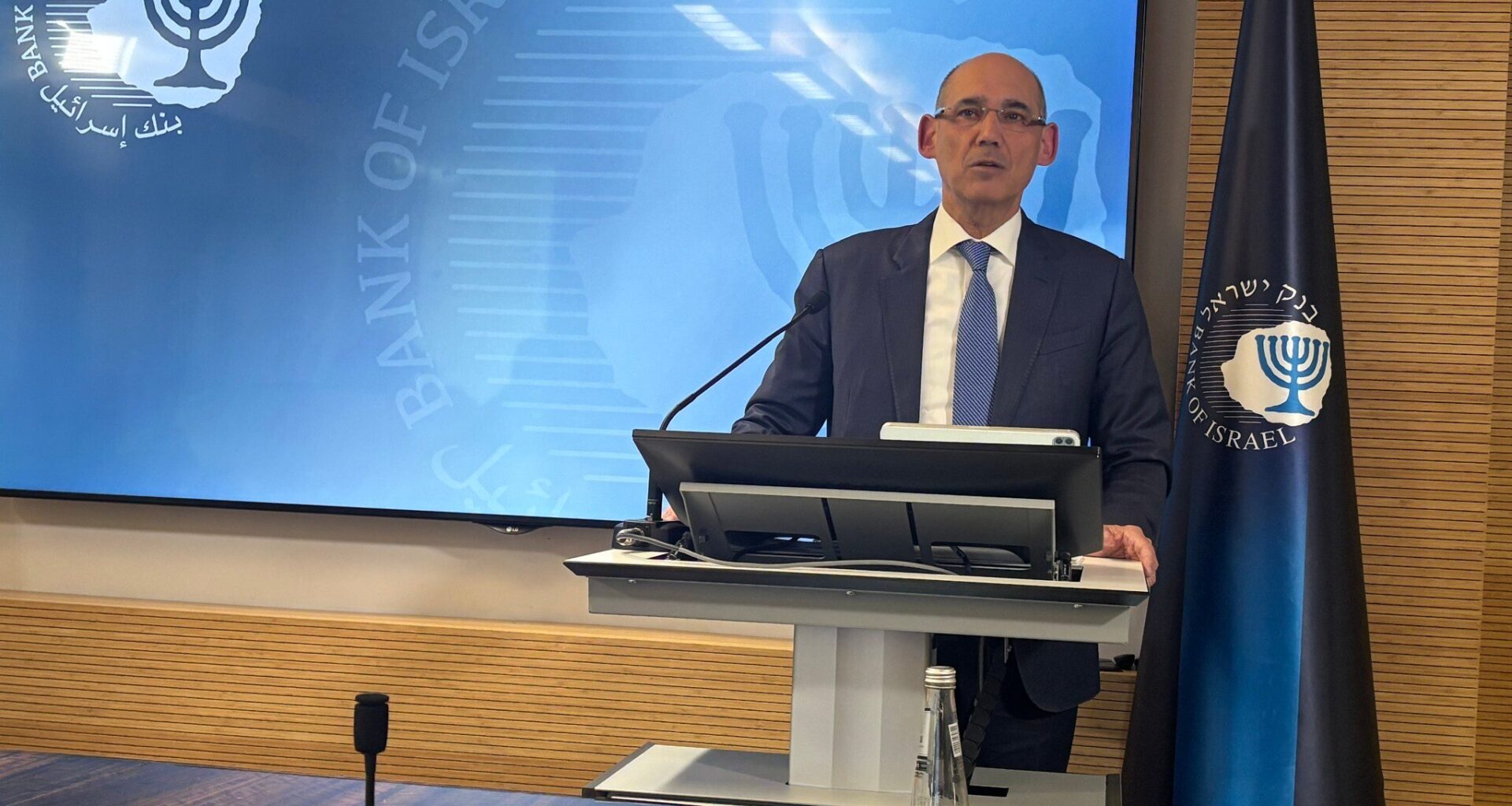The Bank of Israel on Monday left interest rates steady as Governor Amir Yaron warned that prolonged intense fighting with the Hamas terror group in Gaza and a worsening international sentiment will continue to take a toll on investments and prevent economic recovery.
“Israel’s economy continues to act in an environment of high geopolitical and economic uncertainty, [and] international sentiment toward Israel [that] has recently deteriorated,” said Yaron. “As a small and open economy, Israel depends to a considerable extent on its participation in the global economy — in terms of international trade, foreign investment in the economy, and various collaborations.
“Therefore, Israel must do all that it can to strengthen its international standing, and thus ensure that the economy is open, entrepreneurial, and robust,” he urged.
Yaron made the comments at a press conference in Jerusalem as the Bank of Israel kept interest rates steady for the 14th consecutive time, arguing that current “economic conditions do not yet justify a rate cut.” The rate decision was announced just hours before Prime Minister Benjamin Netanyahu was scheduled to meet US President Donald Trump at the White House to discuss a potential deal to end the war in Gaza.
Yaron has come under fierce scrutiny for failing to lower borrowing costs as households and businesses struggle to make mortgage and loan repayments during the ongoing two-year war with Hamas. Finance Minister Bezalel Smotrich threatened to lower taxes if the central bank did not start cutting interest rates to ease the pressure on borrowers.
Sign up for the Tech Israel Daily
and never miss Israel’s top tech stories
By signing up, you agree to the terms
“Reducing taxes now is like drinking espresso after taking a sleeping pill,” said Yaron, in response to questions from journalists.
Finance Minister Bezalel Smotrich, right, and Bank of Israel Governor Amir Yaron attend a press conference in Jerusalem on August 6, 2025. (Yonatan Sindel/Flash90)
The central bank last reduced interest rates in January 2024, the first cut in almost four years, to support households and businesses as the economy was getting battered by the war, triggered by Hamas’s October 7, 2023, onslaught.
“In light of the economic and geopolitical challenges, there is room to examine whether the current monetary policy is consistent with the needs of the economy, industry, and exports,” Manufacturers Association of Israel President Ron Tomer said, following the rate decision. “The law defines a dual role for the Bank of Israel — maintaining price stability, while supporting growth and employment.”
“At a time when exporters are facing cancellations of deals from European partners, it is important to ensure that monetary policy does not add to these difficulties,” Tomer said.
In recent weeks, European countries have ramped up pressure on Israel amid the fighting in Gaza, warning of sanctions and downgraded trade ties alongside arms embargoes already going into effect.
Alongside the rate decision, the central bank cut its growth forecast for the economy for this year. The economy will grow by 2.5 percent in 2025, down from a previous growth estimate in July of 3.3%, according to the updated outlook. In 2026, the economy is expected to grow by 4.7%, up from a previous estimate of 4.6%.
“The forecast was formulated following the broad mobilization of reserve soldiers and the beginning of a significant ground campaign in the Gaza Strip, and under the assumption that the fighting in Gaza will continue at varying intensity and will end during the first quarter of 2026,” said Yaron.
Shoppers buying groceries at the Mahane Yehuda market during the war with Iran, on June 17, 2025. (Rossella Tercatin/Times of Israel)
The Bank of Israel chose not to lower borrowing costs even as annual inflation in August retreated to 2.9%, and moved within the government’s target range of 1% to 3% for the first time in more than a year.
“In view of the considerable uncertainty and volatility, we are not relying on one or another data point,” Yaron explained. “Inflation will remain around the upper bound of the target in the coming months, and is forecast to even move above the upper range, before moderating at the beginning of 2026.”
The central bank updated its forecast and now expects year-over-year inflation at the end of 2025 to hover around 3%, up from 2.6% in the July outlook. Assuming intense fighting will end at the beginning of next year, inflation is forecast to retreat to 2.2% in 2026, versus 2% in the previous forecast.
“Geopolitical and economic uncertainty in Israel is still at a very high level…in such an environment, it is necessary to have a clearer picture of the economic trends and of the convergence of inflation to within the target range,” said Yaron. “Lowering interest rates too early could backfire and fuel high inflation, which adversely impacts economic activity, particularly among the weaker population groups.”
The two-year multi-front war has already taken a toll on the economy. Economic growth contracted an annualized 4% in the April to June quarter, as 12 days of fighting with Iran in June led to a shutdown of many businesses and hurt consumer spending, exports, and investment.
Yaron noted that current economic indicators show a continued moderate recovery, citing increased credit card expenditures and volatile real estate and housing prices.
“Given that the Bank of Israel now expects that inflation in Israel will not move significantly from the upper limit of the inflation target [of around 3%] in the coming months, it will be difficult to see that the central bank will lower interest rates in the near future,” said Mizrahi Tefahot Bank chief markets strategist Ronen Menahem.
Is The Times of Israel important to you?
If so, we have a request.
Every day, even during war, our journalists keep you abreast of the most important developments that merit your attention. Millions of people rely on ToI for fast, fair and free coverage of Israel and the Jewish world.
We care about Israel – and we know you do too. So today, we have an ask: show your appreciation for our work by joining The Times of Israel Community, an exclusive group for readers like you who appreciate and financially support our work.
Already a member? Sign in to stop seeing this
You appreciate our journalism

You clearly find our careful reporting valuable, in a time when facts are often distorted and news coverage often lacks context.
Your support is essential to continue our work. We want to continue delivering the professional journalism you value, even as the demands on our newsroom have grown dramatically since October 7.
So today, please consider joining our reader support group, The Times of Israel Community. For as little as $6 a month you’ll become our partners while enjoying The Times of Israel AD-FREE, as well as accessing exclusive content available only to Times of Israel Community members.
Thank you,
David Horovitz, Founding Editor of The Times of Israel
Already a member? Sign in to stop seeing this


